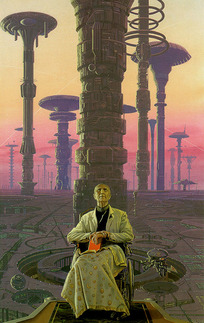
The book is set far in the future, with humankind spread over the entire galaxy. The great galactic empire is corrupt and starting to fail, but one man uses his knowledge of mathematics to predict the future, and set up a Foundation which should make the Dark Ages to come shorter. What follows is essentially a series of short stories, charting the various crises that befall the Foundation over the first 200 years, and how each different lead character attempts to overcome them.
The first disappointment I had was with the writing. Quite frankly, the prose is poor, with clunky repetitions breaking an otherwise pedestrian style. The characters are thinner than the pages it's written on. The hero of each story is wily and relies on his wits; realising the pattern Asimov makes the last hero a bit rougher - more cunning than wily. The baddies are all full of bluster but ultimately cowards. The plan of action the hero follows in each story is remarkably similar, with an almost deus ex machina twist explained at the end.
Asimov may be considered one of the greatest Science Fiction writers of all time, but no-one has much good to say about his style. Here's science fiction scholar James Gunn:
"they are not stories in which character plays a significant part. Virtually all plot develops in conversation with little if any action. Nor is there a great deal of local color or description of any kind. The dialogue is, at best, functional and the style is, at best, transparent"
So, if the writing, characters and plot aren't much cop, what stands in his favour? I believe the reason I used to love Sci-Fi & Fantasy so much as a child was the sense of creating a world in your imagination, which also explained why I spent a lot of time scribbling out imaginary maps and deciding what languages the different tribes who lived there spoke. The world that Asimov creates is interesting, but without any real people in it, it feels less absorbing to me now. The most intriguing thing is his vision of future technology.
Foundation came out in 1951, and Asimov is understandably obsessed with 'Atomics' (an obsession echoed in Michael Whelan's cover shown above). Most of what could be called a plot revolves around who has access to atomic technology, and how much they understand about it. This might seem strange to us now, despite parallels in the current travails with Iran & North Korea, but to be fair to Asmiov, if you're going to have interplanetary empires you're not going to be able to scoot around using fossil fuels. An atomic penknife might be pushing things a bit, but it's an interesting reminder of the atomic age people thought we were on the verge of in the 50s.
What is far more striking is the complete absence of electronics. There isn't a single computer in the book, and people regularly pass each other microfilms, or get messages from those weird capsules that shoot through tubes. Due to the lack of description it's very easy to make the setting seem like contemporary visions of the future, but I found it much more satisfying when I started imagining Mad Men in space. Probably the closest realisation is something like Brasil, though there's a definite upbeat American feel to Foundation in contrast to Gilliam's slowly collapsing British dystopia.
It can be hard not to laugh at some of the things people in the future have to deal with, given that we all carry round in our pockets computers more advanced than any ever created when Asimov wrote this. The main task of the Foundation, an encyclopaedia of all knowledge, becomes a little less dramatic:
"I need 100,000 of the greatest minds of our time."
"What is the purpose of your hundred thousand?"
"To update wikipedia!"
Yet to the extent that I can say I enjoyed this book, it was mostly this charming glimpse of a possible future of the past. The allusions to the decline and fall of the Roman Empire are reasonably interesting but hardly illuminating. It did provide some food for thought, but if it's meant to be a novel of ideas then it compares unfavourably with an afternoon spent browsing the internet.
Despite all my problems with it, I can't say I hated it. It was such an easy read it can be boshed through quickly. I am vaguely curious as to what happens in the second book, loosely based on the Arab conquests, especially as Al-Qaida (Arabic for the Foundation) has been tenuously attributed as being named after the series. However, given the Muhammed character is called the Mule, and the donkey is the butt of most Arabic jokes, I'm not expecting deep insights here.
As to the passage that disturbed me so much? It wasn't there. Perhaps it's in the second book. Perhaps I imagined it myself. It's not the end of the world...

 RSS Feed
RSS Feed
